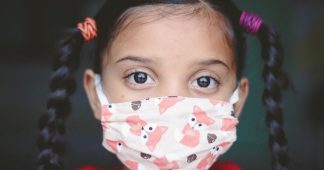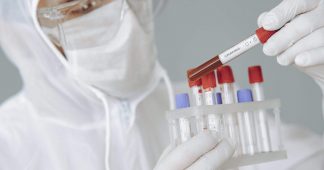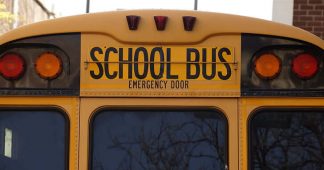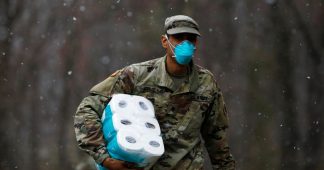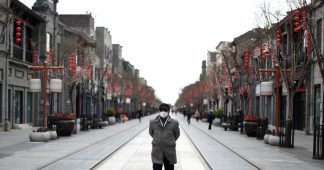A month and a half after the widest reopening of schools in Brazil since the beginning of the COVID-19 pandemic, there are clear indications that the novel coronavirus is infecting growing numbers of children, along with reports in the Brazilian media of COVID-19 child deaths. This coincides with the spread of the more infectious Delta variant throughout the country, accounting now for 62.4 percent of cases.
For infected children who survive, the damage could be disastrous. In an interview with the World Socialist Web Site, Lucas Ferrante, a researcher at the renowned National Institute for Amazonian Research (INPA), warned, “We are creating a generation” that will suffer multiple known and unknown effects from COVID-19.
Although Brazil is recording a drop in the number of cases and deaths from COVID-19, on September 15 it had 793 deaths and 14,780 new cases, figures that represent a major underestimation of the real situation. In total, the country has recorded 590,000 deaths—second only to the United States—and more than 21 million cases.
In the Federal District, the infection of children and young people under the age of 19 has soared. The incidence of cases in this age group increased from 3 percent in March 2020 to 14 percent last month, with two of the 14 child and youth deaths from COVID-19 occurring in August. According to the SINPRO teachers’ union, there are now 98 schools in the district with recorded cases, a 30 percent increase in 10 days.
In Maringá—the third largest city in the Southern state of Paraná, with 400,000 inhabitants—pediatric and neonatal COVID-19 ICU beds registered a 100 percent occupancy last week. The media has reported the deaths of two children, one six and the other an 11-year-old, in the state within the last two weeks. By the end of August, Paraná had recorded 166,479 cases and 101 COVID-19 deaths of children and youth under 19.
In early August, after in-person learning resumed, Rio de Janeiro recorded 64 hospitalizations of children under the age of nine, the highest number since the beginning of the pandemic. In mid-August, 36 cities in the state, including the capital, Rio de Janeiro, were forced to close their public state schools because of the high number of cases.
In São Paulo, 3,600 cases were registered in state public schools in August. Of this total, 78 percent of the cases were among students. This week, the maximum occupancy of students in many state public schools increased from 50 percent to 100 percent. Day care centers in the state capital, São Paulo, also returned to 100 percent occupancy this week.
On September 6, the city of Queimadas in Bahia suspended classes after a six-year-old girl, Ana Vitória Oliveira Mercês, died of COVID-19. On September 12 and 13, the Brazilian media reported the deaths of two other children under the age of six in the states of Mato Grasso do Sul and Minas Gerais.
The nationwide school reopenings will undoubtedly worsen a situation that is already dramatic in Brazil. COVID-19 has already killed 1,581 young people aged 10 to 19 in the first half of 2021, making it the leading cause of death by disease for this age group. Another 1,187 children under the age of 10 have succumbed to the virus since the pandemic began, almost half of them under the age of two. Brazil is the country with the highest number of child deaths from COVID-19 in the world.
Lucas Ferrante, the National Institute for Amazonian Research (INPA) researcher who spoke to the WSWS on child deaths and infections, has been one of the Brazilian scientists most critical of fascistic President Jair Bolsonaro’s herd immunity policy and the reopening of schools. Ferrante has also denounced the federal government’s environmental and genocidal indigenous policies, which has earned him a series of death threats.
In August of last year, three months after a devastating first wave of COVID-19 in Manaus, Ferrante was the lead author of a letter published in Nature Medicine warning of the risk of a second wave if schools and nonessential services were not closed in the city. In January of this year, horrific scenes of people dying due to lack of oxygen shocked the world.
In late August, he led a study published in the Journal of Public Health Policy, titled “How Brazil’s president turned the country into a global epicenter of COVID-19.” It established that “The emergence of the Gamma variant in Manaus [at the end of last year] occurred due to the federal government’s strategy of encouraging the contagion of children with the return of in-person classes so that the population would reach herd immunity.” The Gamma variant is responsible for two-thirds of COVID-19 deaths in Brazil.
Despite being interviewed by major national and foreign media outlets about the pandemic in Brazil, Ferrante stated that his denunciations of the danger of reopening schools are almost always suppressed. “I have been interviewed by all the major international media— Le Monde, New York Times, CNN International —and the only agenda that they don’t want to take forward, that we notice that the editors bar, is the one of the risks of [in-person] classes.”
“The emergence of the Gamma variant was due to the return of in-person classes”
According to Ferrante, a week after the reopening of elementary schools in Manaus in early October of last year, “there was a 40-percent increase in urban mobility … and these people who were in social isolation started to live together … increasing community transmission in the city immensely.”
He continued, “Exactly 21 days after the massive return, which is the period of the viral cycle, you have an explosion of cases, hospitalizations and deaths. … We see that the emergence of the Gamma variant coincides with this explosion of cases generated by [increased] urban mobility” with the reopening of schools. In his August paper, Ferrante ruled out the role of the November elections and the New Year’s celebrations in the emergence of this variant, events that, according to him, only further increased transmission.
This process, he added, would not have happened if children had not played a role in the transmission: “It is impossible for the Manaus scenario to occur if these people [going to school, including children] were not participating in active transmission. In fact, children transmit as much as adults, and that accelerated the community transmission.”
Ferrante denounced the hypocritical claim advanced by governments worldwide that schools must reopen because of the psychological damage caused by social isolation. “Nobody disputes that social isolation causes some psychological damage,” he said, but, he added, “Why is there no discussion of the psychological damage of the loss of a family breadwinner, the loss of a grandparent, a mother?”
In Manaus, Ferrante said, “You had a family that lost 12 adults, [the child] lost his father, mother and grandparents. Look at the COVID orphans that have emerged. Those families are completely broken.” According to a study published in The Lancet in June, 130,000 children in Brazil have lost at least one of their caregivers.
In addition to the damage caused by the loss of a loved one, Ferrante stresses, “For children, in general, you have kidney, neurological, motor and heart damage. … We are creating a generation with COVID-19 sequelae. Will we have social security for these people in the future? We won’t be able to afford to retire people on disability, and many people won’t be able to work and develop the activities they should have because of COVID-19.”
Although children can transmit the virus as easily as adults even when asymptomatic, Ferrante explained, “In fact children have a lower mortality rate than adults. But with the advance of new variants and the increased exposure to the virus with the reopening of schools, children are becoming more infected and that creates a higher mortality.” He warned, “There is no safety for children at all.”
“As the Delta variant spreads across Brazil, it will be much worse than in other countries”
Ferrante disputed the claims being disseminated by the Brazilian media that the situation in Brazil is different from the world’s experience with the Delta variant, since the country has recorded a recent downward trend in cases and deaths. He insisted that “indeed, Brazil is going to be different from these other countries, [but] it’s going to be much worse because we have half the vaccination rate” of countries recently hit by the Delta variant. Today, only 35 percent of the Brazilian population is fully vaccinated.
“Brazil … should be taking restrictive measures to slow the spread of the Delta variant,” Ferrante said.
This should be done with a combination of vaccinations and social isolation, he said: “We have been quite frank in saying: vaccination is extremely important. But we need social isolation as well because once community transmission outpaces our vaccination rate, we need to halt that, which can be done only with social isolation.”
“Bolsonaro has turned Brazil into the global epicenter of COVID-19”
Bolsonaro’s open policy of herd immunity, as well as the various mitigation measures adopted by governors of all political parties and the unions, have made Brazil the “global epicenter of the pandemic because we concentrate the largest number of variants,” according to Ferrante.
“We have 92 strains circulating in Brazil. With them getting transmitted and mutating, there is a risk of recombination. If you have a person who has a double, triple infection … you can recombine the genetic material between one variant and another … and a super-variant between Beta and Delta may emerge. That would be catastrophic, because Beta is the variant that diverges the most from vaccines, and Delta is the most transmissible.”
As with Manaus and the Gamma variant, the wide reopening of schools can accelerate this process and extend the pandemic for years. “The worst thing that we see from the return of in-person classes is an increase in community transmission that can generate new variants,” Ferrante warned. “You’re not only killing people today … you’re extending the pandemic for another two, three years because a vaccine-resistant variant is going to emerge at some point, which is very serious.”
The struggle to close schools in Brazil as part of a global strategy to eradicate the coronavirus is being advanced by the Rank-file Committee for Safe Education in Brazil (CBES-BR). This struggle requires the independent mobilization of the working class so that every measure well known to scientists is utilized to stop the pandemic and save lives. No death can be “normalized.” Follow the CBES-BR Facebook page and contact us to be part of this struggle.
Published at www.wsws.org
We remind our readers that publication of articles on our site does not mean that we agree with what is written. Our policy is to publish anything which we consider of interest, so as to assist our readers in forming their opinions. Sometimes we even publish articles with which we totally disagree, since we believe it is important for our readers to be informed on as wide a spectrum of views as possible.
